A Journey to the Edge of the Earth
PeriBlog III: Exploring Canada's Nootka Sound with John Jewitt
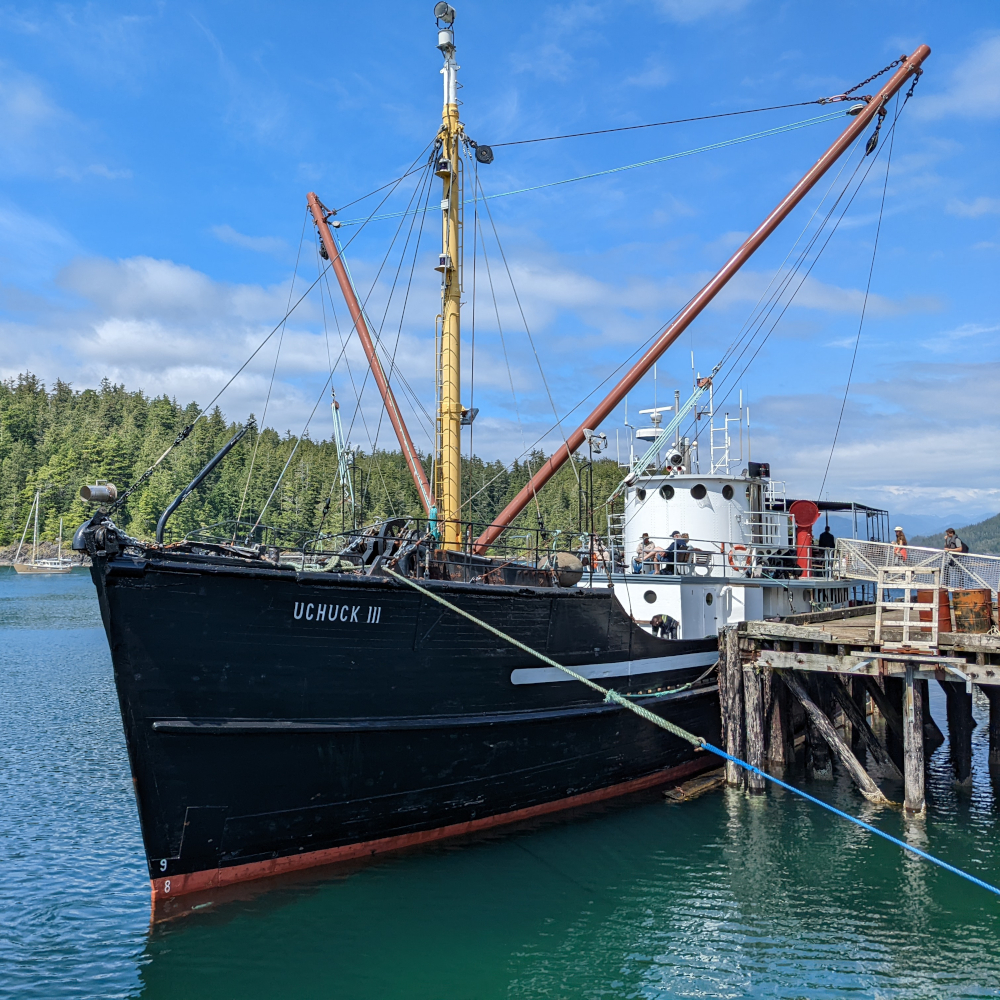
The Uchuck III at Friendly Cove
Canada’s Vancouver Island is famous for its staggering amount of empty wilderness. Most of the Pacific-facing coast cannot be reached by bus, train, or automobile. Want to explore these remote shores? Float plane and boat are your only options, unless you fancy bushwhacking through 100 km or more of rugged forests. It is a land cut off, protected from development and endless rows of beach houses by a thick buffer of mountains and trees.
Nootka Sound, an inlet roughly halfway up the west coast, offers a classic example of this isolation. British Navy Captain James Cook was the first European to land here in 1778. After “discovering” Vancouver Island, he claimed the land, its resources, and its people for his monarch, King George III.
No one asked the locals how they felt about this.
Twenty-five years later, the Boston, a British trade ship, touched north of “Friendly Cove”—a sheltered bay at the mouth of Nootka Sound and the summer fishing grounds of the Mowachaht people. Captain Salter managed to insult the local tribal leader, Maquina. On the evening of March 22, 1803, a band of warriors stormed the ship after nightfall and slaughtered the entire crew—save John Jewitt, whose life was spared when the natives learned that he was a blacksmith. A sail-maker named Thompson also survived the night when Jewitt convinced Maquina that the older man was his father.
As the blood of the dead leaked into the ship’s scuppers, Maquina offered the survivors a choice—death or enslavement. “John—I speak—you no say no; you say no—daggers come.”
Jewitt gave the obvious answer. For the next two years he and Thompson lived in Maquina’s household, valued slaves trapped on the island’s remote coast.
I wanted to visit this historic region, the point of first contact with Europeans, as well as the place where Jewitt lived out his captivity. It is nearly as difficult to reach Nootka Sound today as it was in John Jewitt’s day. Twice a week a boat, the Uchuck III, carries passengers to the island. It is a two-and-a-half hour journey: down Muchalat Inlet, across Nootka Sound, and into the harbor at Friendly Cove.
The road from Gold River terminates at a pier nestled between a log sorting yard and the Nootka Air seaplane dock. The log loaders were silent on this Saturday morning, but two forklifts, loading a landing craft with shrink-wrapped pallets of cargo bound for the remote communities, filled the air with a mechanical cacophony. Across the water, tucked against the mountain that rose from the distant shore, a single sailboat hung on an anchor line.
Loading complete, the landing craft fired its bow thrusters and eased away from the dock.
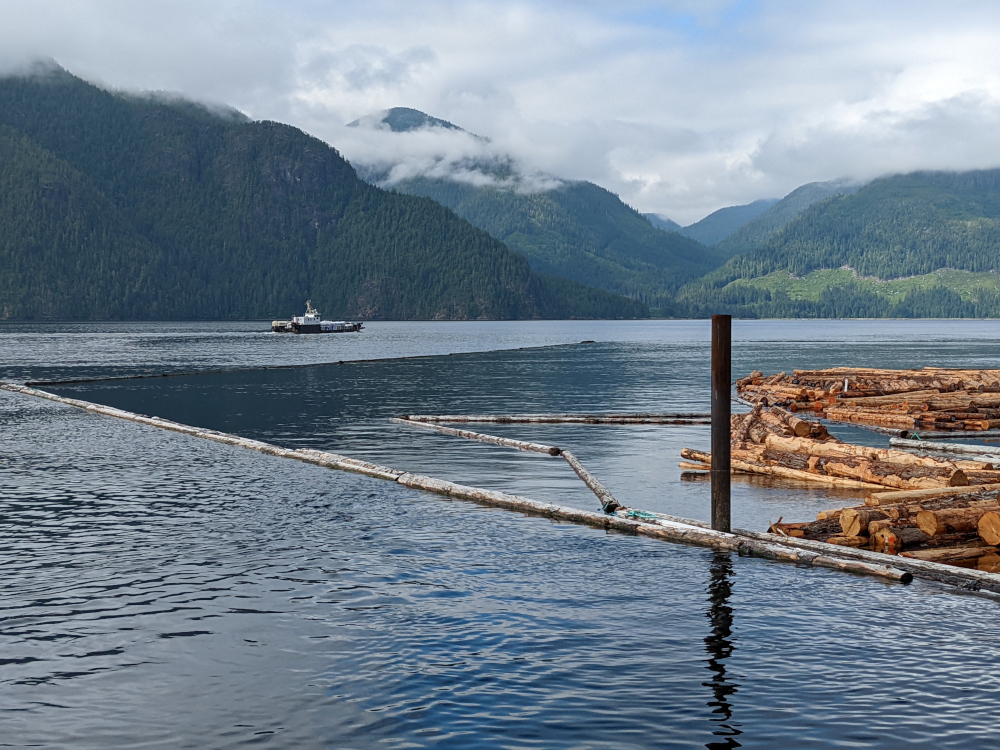
Load complete, the landing craft heads down down Muchalat Inlet
With the loading zone now clear of flying forklifts, about forty passengers clumped aboard the Uchuck III. The ship is a 136 foot long former US Navy minesweeper that was converted into a passenger vessel in 1955. A long, two-decked vessel, the Uchuck III accommodates a maximum of 100 passengers and carries a crew of six. The ship also has a large cargo hold forward and once served as a lifeline for the small communities that live in coastal isolation.
The twin diesel engines grumbled to life. Minutes later we chugged out into the center of the inlet and turned west. Glacier carved basalt mountains, cloaked in Douglas Fir, plunged 2,500 feet into the sea. Apart from the occasional salmon farms and a clearcut that stripped the land down to the water line, there was no sign of human habitation. No houses, visible roads, or Walmarts.
Empty wilderness.
The land’s remoteness is one of the consistent themes in John Jewitt’s account of his enslavement. He and Thompson constantly feared that Maquina might withdraw his favor and the warriors would complete the slaughter of the ship’s crew, but at a deeper level, he appeared to fear that they might not. Jewitt’s greatest fear was that he and Thompson would be forced to spend the rest of their lives in the rain-soaked green forests, cut off from what he called “civilization.”
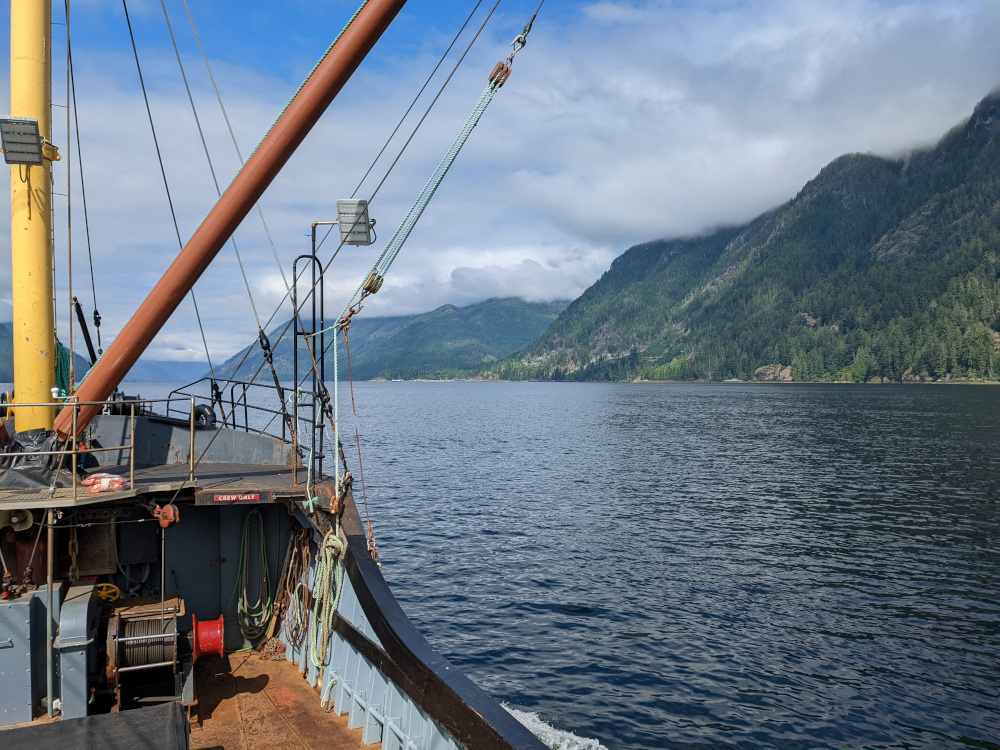
Adrift in an empty land
Although I did not find the thousands of square miles of empty forest oppressive, I felt the weight of the emptiness on the back of my neck as the Uchuck motored west.
We approached Yuquot at 12:30. A white lighthouse and keeper’s house, both topped with red sheet metal roofs, clung to the top of the southern hill that shields the harbor from Pacific storms. The word Yuquot means “where the wind blows from every direction.” Water surrounds the site of the ancient village on three sides; when the winter storms claw ashore, the exposed headlands feel the angry lash.
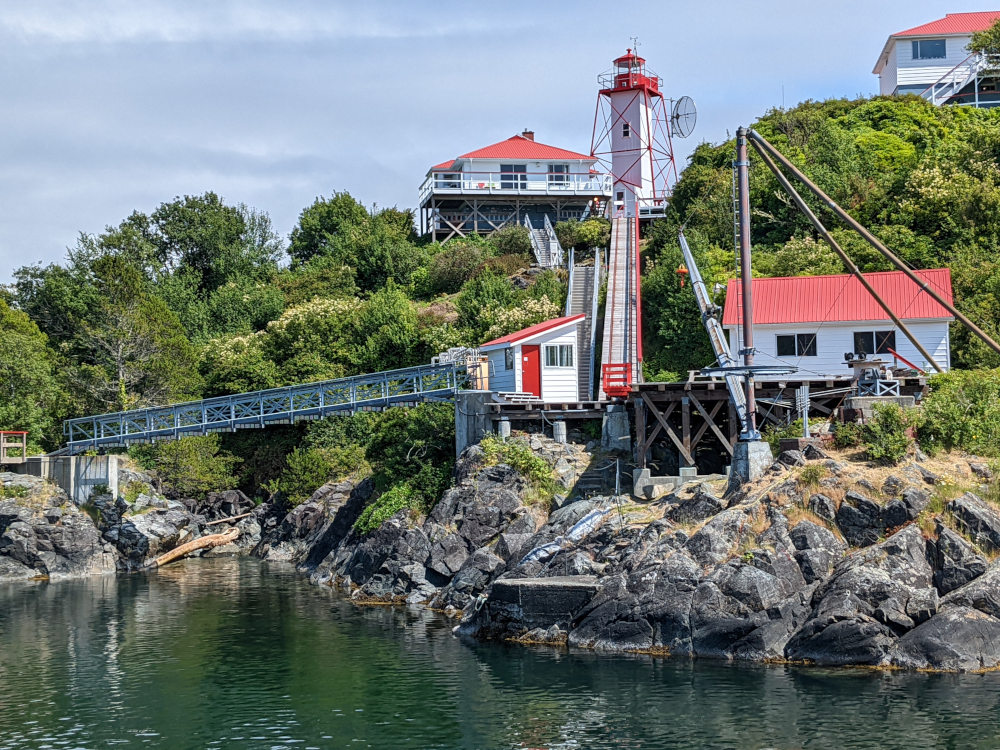
Lighthouse, Friendly Cove, Canada
In Jewitt’s day the Mowachaht people spent part of each year in Yuquot. They lived communally in long cedar plank houses that were easily disassembled and transported on canoes to inland sites. Today the houses are gone. The Canadian government, in a misguided attempt to force assimilation upon the country’s indigenous people, “encouraged” villagers to relocate to Gold River. Most did.
Only one elder remains as a permanent resident on the island. He refused relocation, claiming that there were no halibut in Gold River.
After the Uchuck III docks at the long east-stretching pier, we passengers fan out over the southern tip of the island. For three hours the island is overrun with tourists. Backpackers, who have just completed the West Coast Trail, flop on the beach like sea lions, watching us with mild derision. The hikers earned their place here after suffering through a five day hike from the northern tip of the island, where they were dropped by seaplane. A couple of sailboats anchored in the sheltered Friendly Cove provide another source of visitors, but I imagine that the island will be very quiet after the Uchuck departs.
We stroll over the small spit of land to the Pacific-facing beach. Fine rounded pebbles, ranging in size from small hailstones to frozen peas, spin beneath our footsteps. There is no sand, just this tough walking surface. A totem glares out over the water, harsh eyes staring down the sea, defying it to leave its place.
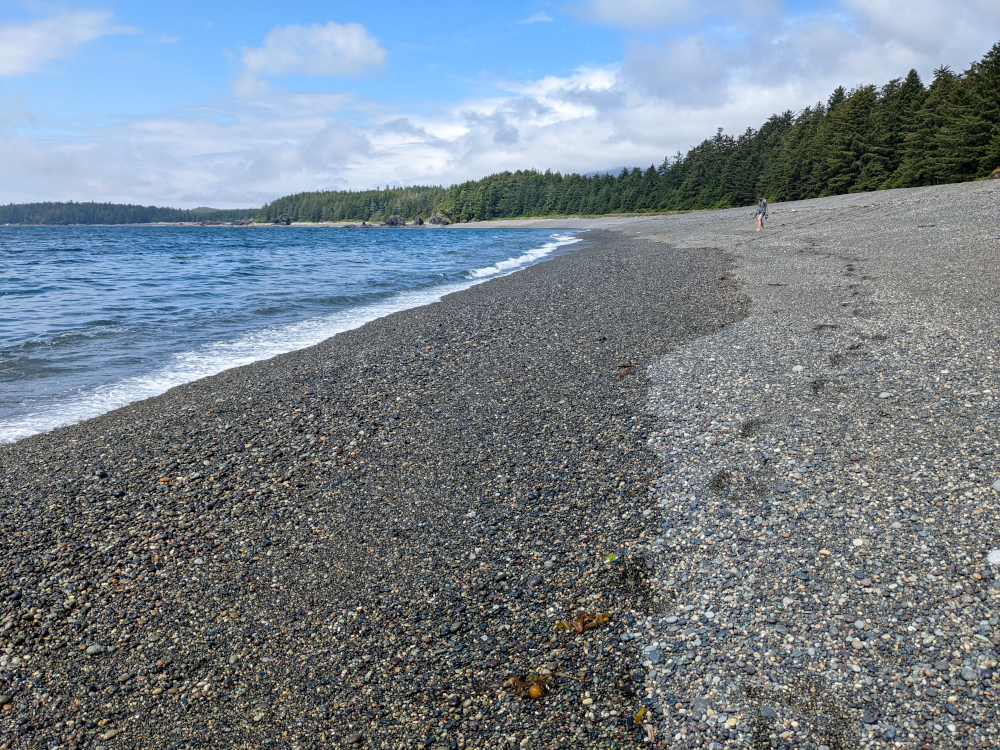
The fine pebbles of the Pacific-facing beach
A trail runs north, paralleling the shore. It passes through a native cemetery and a handful of small red cabins—these can be rented, but you need to pack in all of your supplies. There are no stores or restaurants on the island. Nor does it appear that the cabins have power. The bathrooms stand outside, found in the top of two-story outhouses.
I don’t recommend using the lower level.

Two-decker outhouse; avoid the lower level
The Nootka Lighthouse is manned by a husband and wife team, Doug and Donna. After a career running a photography business on the mainland, Doug “retired” to serve as a lighthouse keeper.
It is amazing to learn that men and women still man these remote outposts. In the quest for ever-greater efficiency, the government had launched a program to automate its lighthouses. Then, in a burst of enlightenment, the ministers decided to consult the people who actually relied on these navigational aids. Commercial fishermen and other users rejected automation. Station keepers kept the lighthouses on line, performed routine maintenance, monitored weather, collected environmental samples, and prevented vandalism. They were considered worth the additional expense.
Miraculously, the government bent to the wishes of the proletariat and stopped automation. Today, Doug told me, about half of all Canadian lighthouses still have keepers.
The Nootka Light uses a powerful Fresnel lens to concentrate a beam that can be seen for eighteen miles. The efficient lens is lit with a 35 watt bulb—the same size and shape of a large Christmas tree light.
It is a lonely post, Doug said. Our visit was blessed with abundant sunshine and a torpid breeze. Most days on the island aren't like that. Winters are long, relieved only by the occasional Coast Guard helicopter rotating down onto the nearby landing pad or the supply ship that brings oil and food.
If you wanted to put some distance between yourself and civilization, this would be the ideal job and place.

Company is infrequent at Yuquot
John Jewitt found it nearly unbearable. As his second year of captivity at Yuquot drew to a close, his dream of rescue waned: “Our situation had now become unpleasant in the extreme. The summer was so far advanced that we nearly despaired of a ship arriving to our relief, and with that expectation almost relinquished the hope of ever having it in our power to quit this savage land.”
As despair strengthened its hold on the two men, a miracle happened. A friendly chief slipped a note to the captain of a visiting fur-trading ship. When Samuel Hill learned that there were two British sailors ashore, he invited their master, Maquina, aboard his ship. The unsuspecting chief carried a letter from Jewitt, which asked the captain to take Maquina hostage and hold him aboard until the tribe released the captive sailors.
The plan worked flawlessly; the two Europeans were exchanged for the more valuable chieftain.
Jewitt sailed away on the Lydia, expressing no regret. Although he abandoned a wife and child, he didn’t look back. Once the Lydia completed its cargo of otter skins and sailed for China, he never returned to Vancouver Island.
Our escape from the island came at 3:15 p.m. After much too short of a time ashore, the Uchuck III sounded a loud blast of its horn to recall passengers to the ship. By 3:30 we had cast off and turned east. Yuquot, Friendly Cove, and the empty wilderness that had tormented Jewitt for two years, slipped into the ship’s wake.
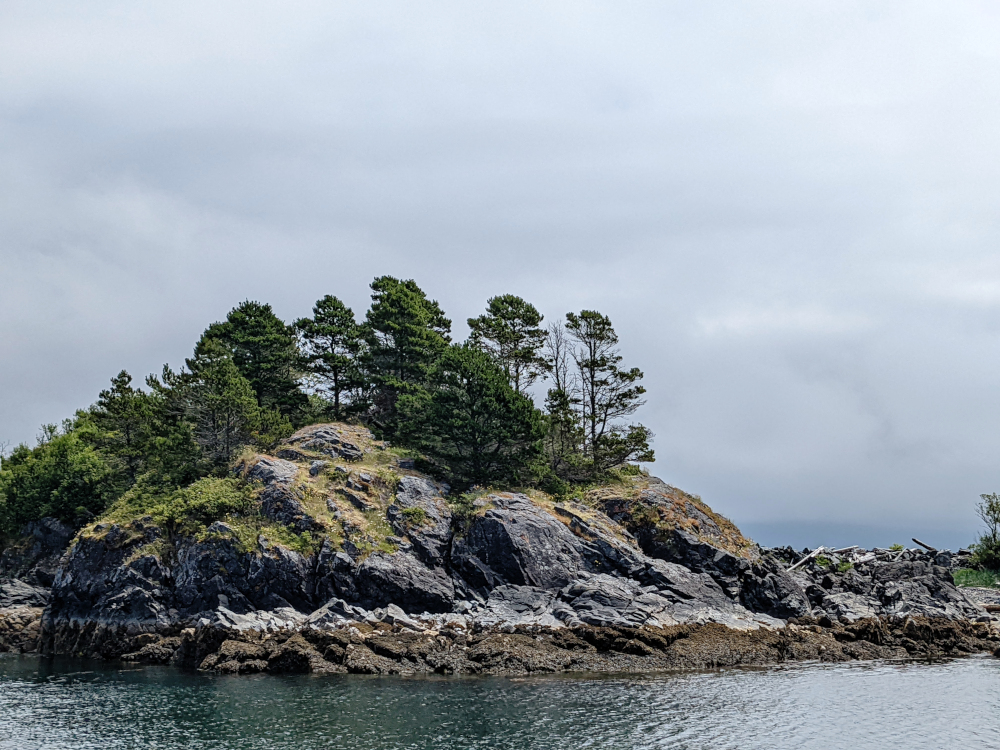
Lonely island, Nootka Sound
If you are enjoying this series, why not subscribe to Richard's monthly newsletter, What's New in Old News? The Peripatetic Historian is on the road, roaming the world and compiling fresh adventures. Don't miss out. Click here to join the legions of above-average readers who have already subscribed.